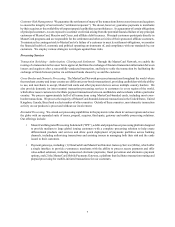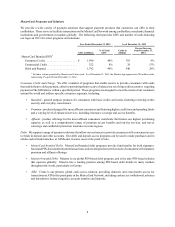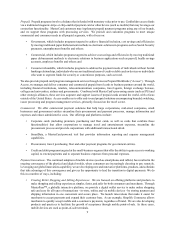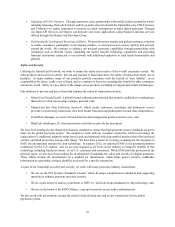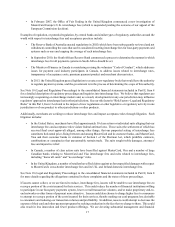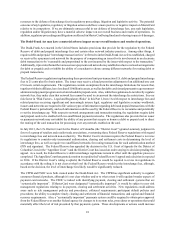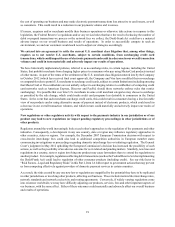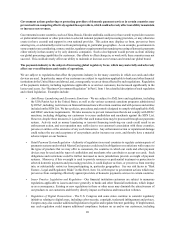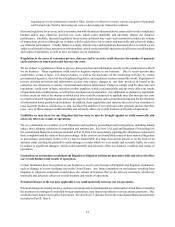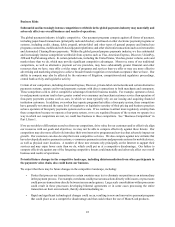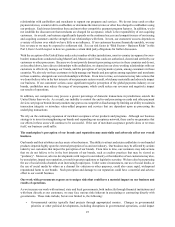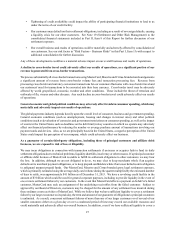MasterCard 2013 Annual Report Download - page 21
Download and view the complete annual report
Please find page 21 of the 2013 MasterCard annual report below. You can navigate through the pages in the report by either clicking on the pages listed below, or by using the keyword search tool below to find specific information within the annual report.17
• In February 2007, the Office of Fair Trading in the United Kingdom commenced a new investigation of
MasterCard Europe’s U.K. interchange fees (which is suspended pending the outcome of our appeal of the
European Commission decision).
Examples of regulation, or potential regulation, by central banks and similar types of regulatory authorities around the
world with respect to interchange fees and acceptance practices include:
• The Reserve Bank of Australia enacted regulations in 2002 (which have been subsequently reviewed and not
withdrawn) controlling the costs that can be considered in setting interchange fees for four-party payment card
systems such as ours and capping the average of such interchange fees.
• In September 2010, the South African Reserve Bank commenced a process to determine the manner in which
interchange fees for all payments systems in South Africa should be set.
• The Minister of Finance in Canada is considering revising the voluntary “Code of Conduct”, which addresses
issues for payment card industry participants in Canada, to address issues related to interchange rates,
transparency of acceptance costs, premium payment product and merchant discount rates.
• In 2013, the United Kingdom passed legislation to create a new regulatory body that would have the authority
to regulate payment systems, and the government is in the process of determining the scope of this authority.
See Note 18 (Legal and Regulatory Proceedings) to the consolidated financial statements included in Part II, Item 8
for a detailed description of regulatory proceedings and inquiries into interchange fees. We believe that regulators are
increasingly cooperating on interchange matters and, as a result, developments in any one jurisdiction may influence
regulators’ approach to interchange fees in other jurisdictions. See our risk factor in “Risk Factors - Legal and Regulatory
Risks” in this Part I, Item 1A related to the impact of new regulations or other legislative or regulatory activity in one
jurisdiction or of one product to other jurisdictions or other products.
Additionally, merchants are seeking to reduce interchange fees and impact acceptance rules through litigation. Such
litigation includes:
• In the United States, merchants have filed approximately 50 class action or individual suits alleging that our
interchange fees and acceptance rules violate federal antitrust laws. These suits (the settlement of which has
received final court approval) alleged, among other things, that our purported setting of interchange fees
constitutes horizontal price-fixing between and among MasterCard and its customer banks, and MasterCard,
Visa and their customer banks in violation of Section 1 of the Sherman Act, which prohibits contracts,
combinations or conspiracies that unreasonably restrain trade. The suits sought treble damages, attorneys'
fees and injunctive relief.
• In Canada, a number of class action suits have been filed against MasterCard, Visa and a number of large
Canadian banks relating to MasterCard and Visa interchange fees and rules related to interchange fees,
including “honor all cards” and “no surcharge” rules.
• In the United Kingdom, a number of retailers have filed claims against us for unspecified damages with respect
to MasterCard’s cross-border interchange fees and its U.K. and Ireland domestic interchange fees.
See Note 18 (Legal and Regulatory Proceedings) to the consolidated financial statements included in Part II, Item 8
for more details regarding the allegations contained in these complaints and the status of these proceedings.
If issuers cannot collect, or we are forced to reduce, interchange fees, issuers will be unable to use interchange fees to
recoup a portion of the costs incurred for their services. This could reduce the number of financial institutions willing
to participate in our four-party payments system, lower overall transaction volumes, and/or make proprietary end-to-
end networks or other forms of payment more attractive. Issuers could also choose to charge higher fees to consumers
to attempt to recoup a portion of the costs incurred for their services, thereby making our card programs less desirable
to consumers and reducing our transaction volumes and profitability. In addition, issuers could attempt to decrease the
expense of their card and other payment programs by seeking a reduction in the fees that we charge to them. This could
also result in less innovation and fewer product offerings. We are devoting substantial management and financial


